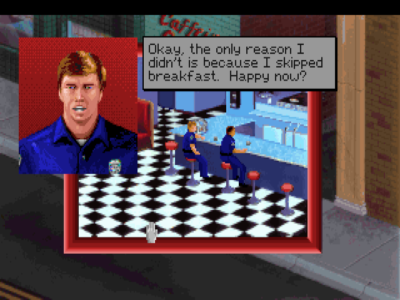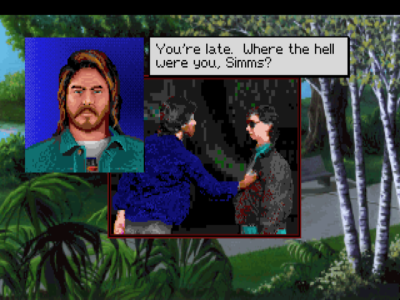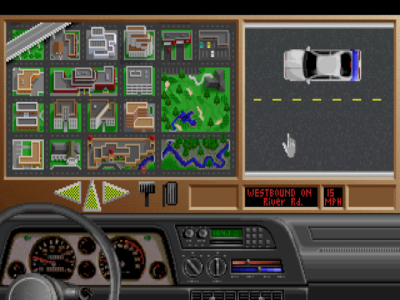
Police Quest (VGA)
Written by: Stoo
Date posted: September 26, 2005
- Genre: Adventure
- Developed by: Sierra
- Published by: Sierra
- Year released: 1992
- Our score: 5
Given how fast technology can move, the category of “old games” can be somewhat vague. At the time of writing, here we’ve recently looked at a lot of titles from three to five years ago – the kind of game you can probably still pick up on budget release from your local gaming store. Now, while we don’t intend to stop covering such titles, Rik and I have decided we need a bit more emphasis on the older oldies also.
For such an agenda, the Sierra adventures are always a good place to start. Those of you who didn’t get into PC gaming until the late 90s might only recall the Sierra of latter days, known as publishers of Homeworld and Half Life. However, jump back a little further in time and Sierra were the “adventure guys”. They invented the graphical adventure with King’s Quest way back in 1984, and then went on to found a number of game lines, mostly with ‘Quest’ in the title. Although Lucasarts provided stiff competition (and arguably superior games) from Monkey Island onwards, the Sierra adventure machine continued until well into the 90s. One of their quest lines was Police Quest, designed by former policeman Jim Walls. These aimed to provide an exciting story about a heroic police officer and his part on the fight against crime. However, they also required the player to follow proper police procedure, as opposed to being some kind of gung-ho vigilante.

Sonny takes a coffee break.
You’ll notice the word VGA hovering at the top of this article – the original dates from 1987 and I’m not quite nostalgic enough to write in depth about that one. However in the early 90s Sierra set about using their SCI interpreter to remake the first games of several of their Quest lines, originally made with the more primitive AGI system. You could view it as a somewhat self-congratulatory move, when those originals weren’t all that ancient at the time. Still, looking back over a decade later I’m not exactly complaining. Apart from greatly improved graphics the remake also grants us a fully point-and-click graphical interface, as opposed to the clumsy text parsers of previous generations. So it’s certainly more accessible overall.
The hero of Police Quest is police officer Sonny Bonds. He’s an all-round likeable, if slightly bland kind of guy; honest and trustworthy, drives a smart car, diligent in his service to the people. I could quite easily picture him being the central character of an undemanding early-90s TV show. Sonny hails from Lytton, a fictional small city in sunny California. Unfortunately the relative peace and happiness of Lytton has recently been threatened by a rise in crime and drug abuse, and rumours are circulating of a nefarious crime boss known as the “Death Angel.”
Sonny begins as a humble uniformed officer on patrol, and the early parts of the game see him dealing with various minor issues an average cop might encounter. Handing out a speeding ticket, arresting a drunk driver, stopping by for a cup of coffee and chat with a colleague. Just to challenge stereotypes however, at no point in this game are donuts consumed. The really significant action begins when he is first on the scene of a nasty murder, but initially the matter is over his head and he’s put back on patrol. Later, however, Sonny’s efforts are rewarded with a promotion to plainclothes work with the Narcotics division, and he becomes directly involved with tracking down the Death Angel.
So then, a fairly solid plot to build an adventure upon. As for the gameplay itself, it doesn’t throw any mindbending puzzles at you. The challenge tends to be more adhering to that proper police procedure. This can get tedious at times, but also adds an air of authenticity to the proceedings. As an example, you’ve got to remember to perform a safety check on your car before going on patrol. Suspects you arrest must be read their rights, and you have to file the correct charges when you bring them in to the county jail. On a more urgent note, one sequence sees you pulling over a car stolen by an armed and dangerous criminal. One wrong step and he’ll shoot you. However, if you decide to avoid the risk and just blow him away before he’s even stepped out of the car then it’s game over, because the good guys aren’t supposed to do that kind of thing.

A drug dealer lurks in the park – his lack of a sensible haircut marks him as a villain. Get him, Sonny!
In fact, make a note of that point – the words “game over”. This can happen not only when you get Sonny killed, but also if you do something foolish that ends his career. Either way, it’s time to restart or reload. This is significant because it highlights a difference in adventure gaming philosophy between Sierra and Lucasarts. The latter more or less removed the concept of failure from their games, aiming for a more relaxed and accessible approach. Sierra, however, were not so forgiving.
Also you have to watch out for in-game copy-protection – a familiar feature of Sierra adventures. Whereas many games of those days asked for a password up-front at startup, Sierra tended to integrate it into the events of the game. For example I mentioned filing charges – the official codes for drug dealing or theft or public nudity are information that must be pulled from the manual. Same goes for the code to Sonny’s locker. For those of you who have, ahem, acquired the game by illicit means you can get what you need from gamefaqs.
On the graphics side, well, if VGA puts you off, this probably isn’t the site for you in the first place. Character’s faces in adventures of those days tended to either feature pixellated features or a blur – this one opted for the latter. Fortunately when holding a conversation, animated portraits pop-up, which helps the people seem a little bit more real.
Finally there’s the driving system to contend with. At its heart is a map view of Lytton, showing your current position. To one side is a little picture of your car, also from overhead, and the road going past. Dashboard displays tell you your speed, and you click arrows to indicate whether you want to carry straight on, or turn at the next junction. Since this is an American town, the layout is just a big grid which keeps navigation straightforward, but it still feels like a laborious exercise overall. Where it gets annoying is chasing other cars – they aren’t drawn on the map, and will only appear on the over-car view if you’re right on top of them. Frequently I found the target just zoomed past and I had no idea how to catch it, other than charging ahead and hoping it hadn’t turned off somewhere.

The driving section can be a chore.
To be honest, the key-driven system in the original Police Quest was superior to this. You might have been steering a small row of pixels around but at least you had better control of your motion, and could actually see other cars (including random traffic, which this one lacks). I can see why Police Quest games implemented such driving schemes, chasing around in your car being fairly integral to a cop’s life, but after a while I was really starting to wish I could just click a map destination and be taken there automatically. Still, at least you can turn on the siren, allowing you to ignore stop signs and drive 10mph faster. There’s no apparent penalty for abusing this to get to your coffee break sooner, which is amusing.
This is another short review. I can’t help feeling Rik would have more to say. Look on the bright side, he’s bound to provide a Monkey Island review sooner or later. Police Quest isn’t the greatest of adventures; It’s a little short, the ending is somewhat anticlimatic and there’s not much in the way of real puzzle solving. Still, it’s pretty solid fare and a decent story to enjoy. Nothing especially gripping, but entertaining for a while. Kind of like the aforementioned undemanding cop show.


 Posts
Posts